一般将来时be+going+to及will用法与练习讲义
文档属性
| 名称 | 一般将来时be+going+to及will用法与练习讲义 | 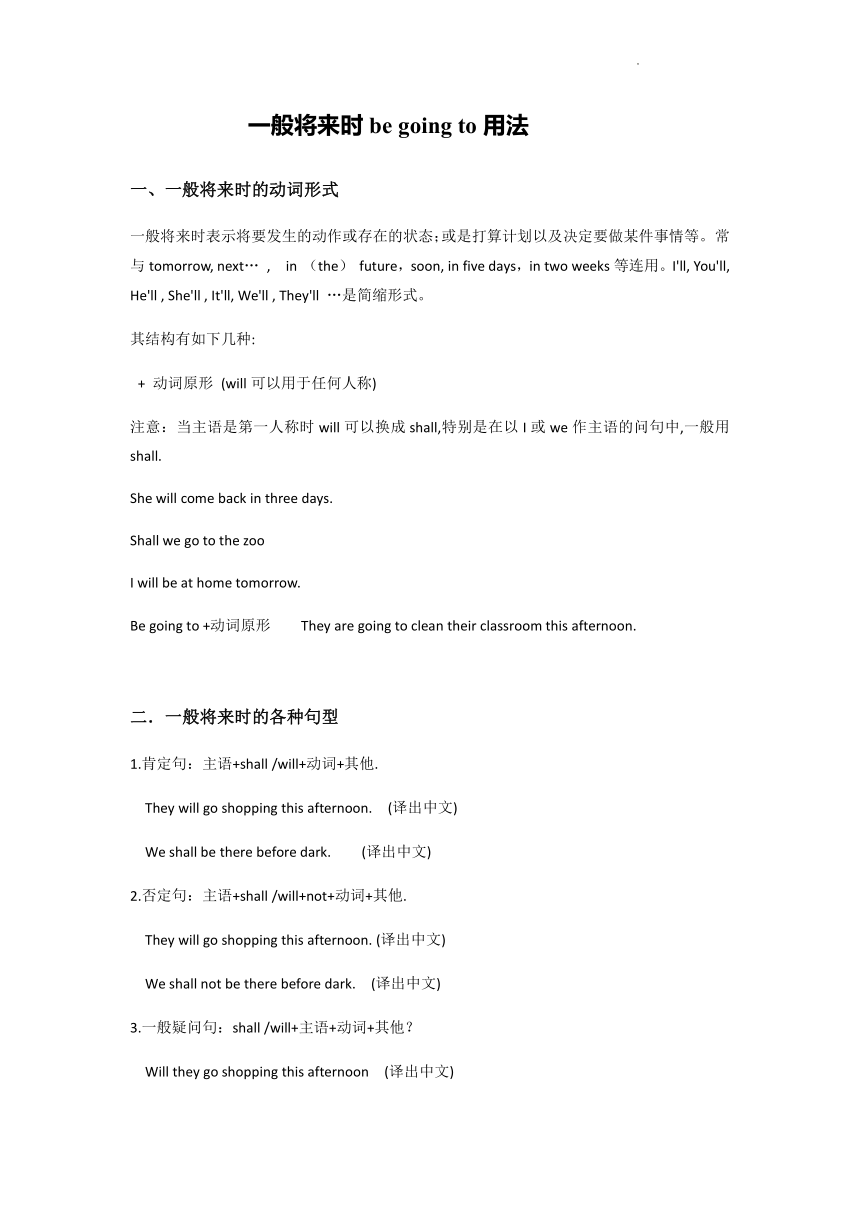 | |
| 格式 | docx | ||
| 文件大小 | 38.0KB | ||
| 资源类型 | 教案 | ||
| 版本资源 | 通用版 | ||
| 科目 | 英语 | ||
| 更新时间 | 2022-04-18 16:51:22 | ||
图片预览

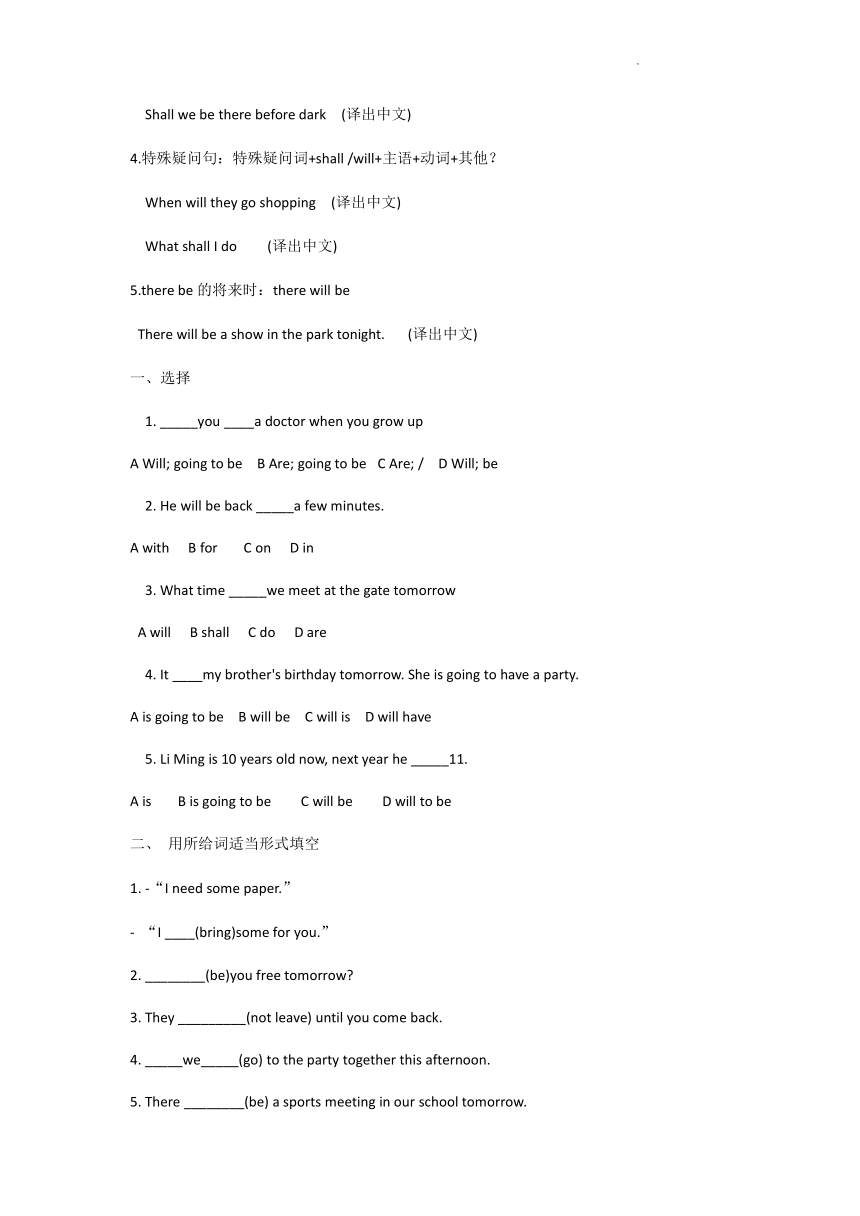
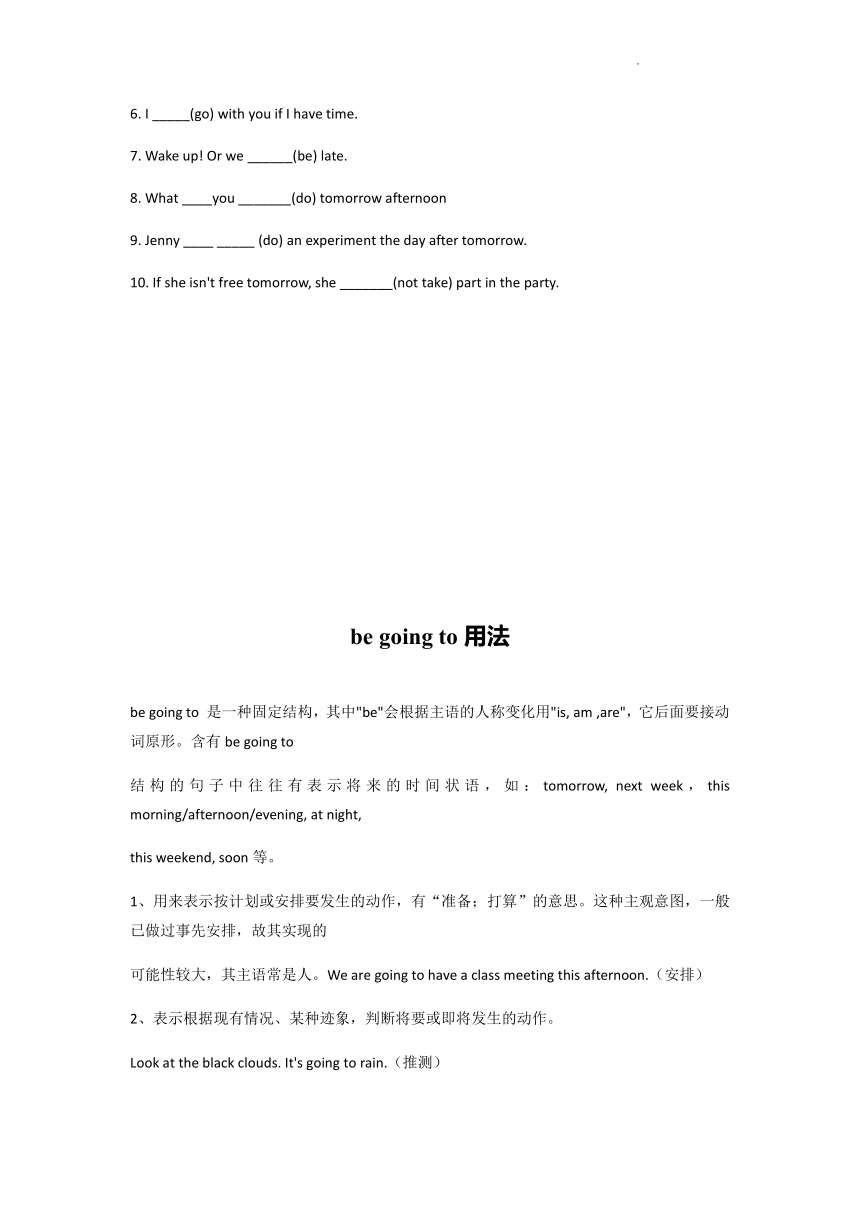
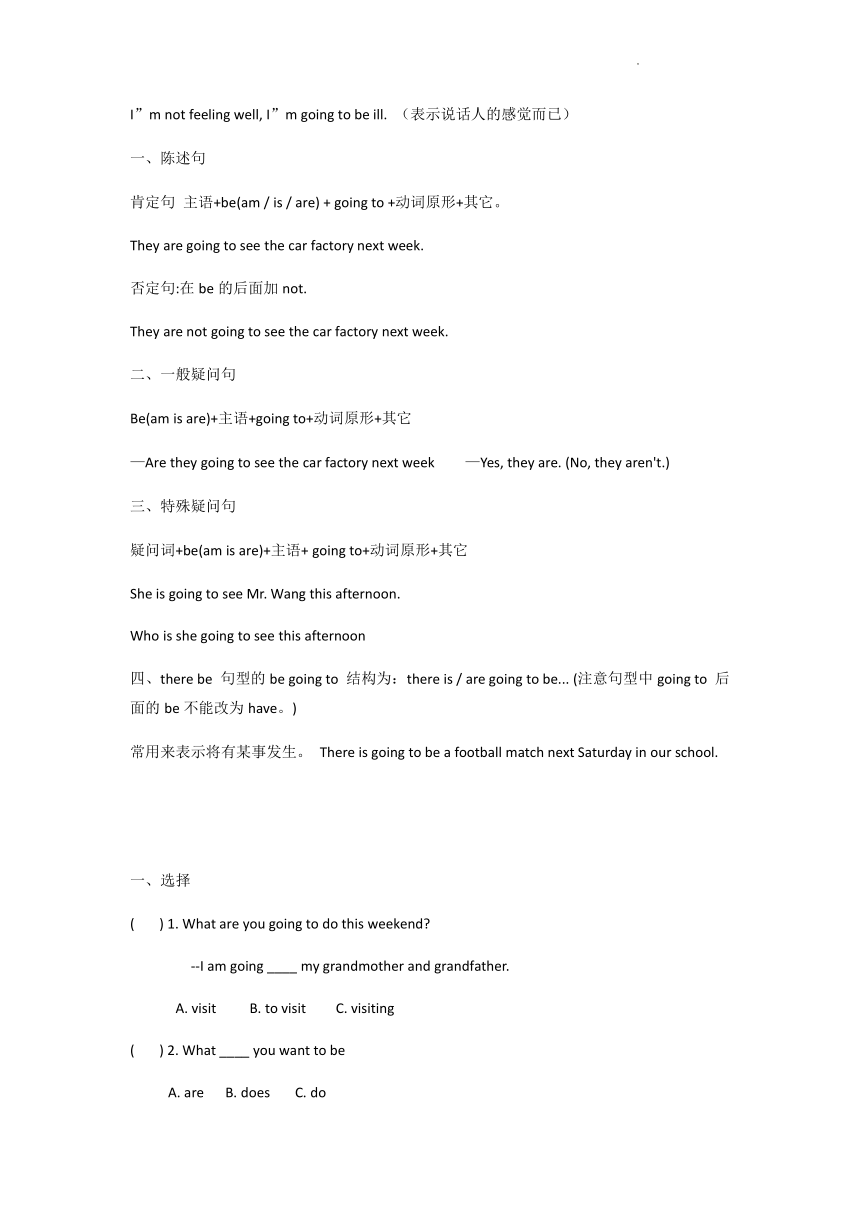
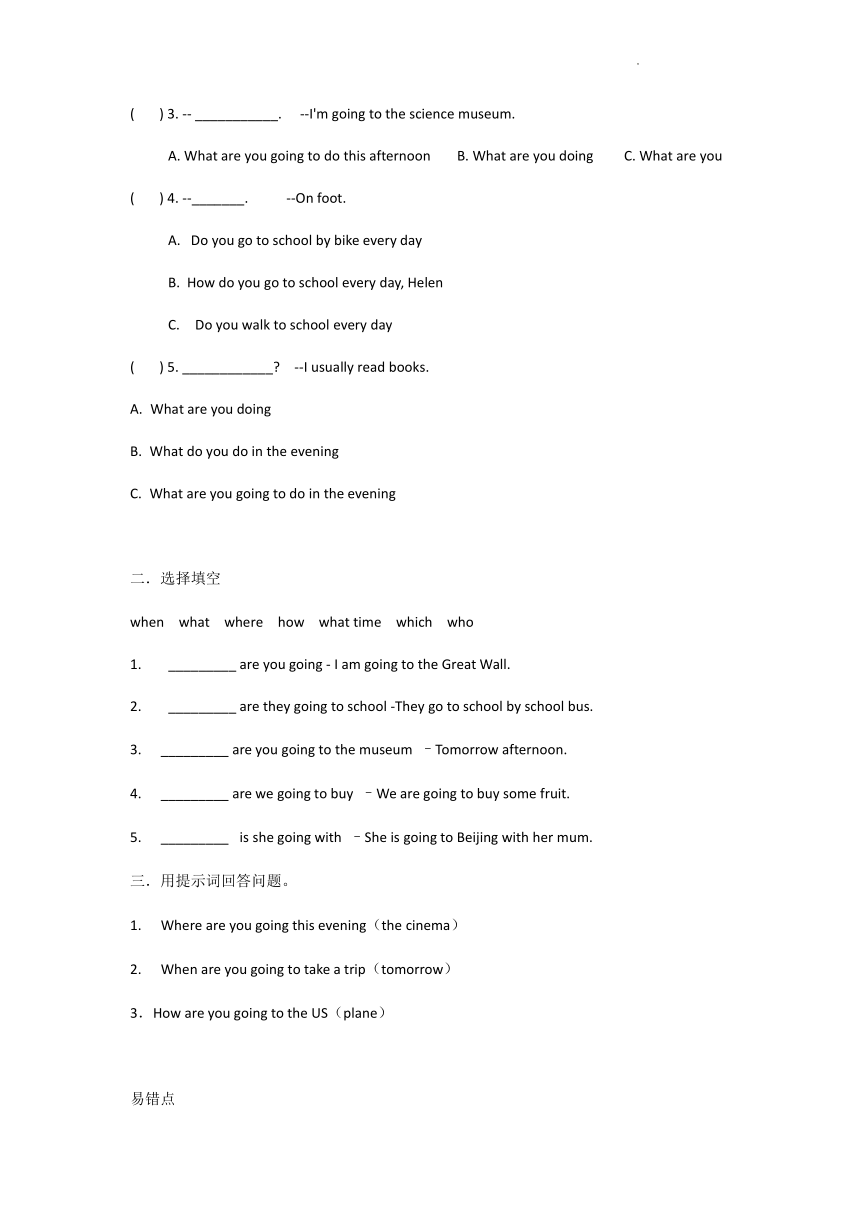
文档简介
一般将来时be going to用法
一般将来时的动词形式
一般将来时表示将要发生的动作或存在的状态;或是打算计划以及决定要做某件事情等。 常与tomorrow, next… , in (the) future,soon, in five days,in two weeks等连用。I'll, You'll, He'll , She'll , It'll, We'll , They'll …是简缩形式。
其结构有如下几种:
+ 动词原形 (will可以用于任何人称)
注意:当主语是第一人称时will可以换成shall,特别是在以I或we作主语的问句中,一般用shall.
She will come back in three days.
Shall we go to the zoo
I will be at home tomorrow.
Be going to +动词原形 They are going to clean their classroom this afternoon.
二.一般将来时的各种句型
1.肯定句:主语+shall /will+动词+其他.
They will go shopping this afternoon. (译出中文)
We shall be there before dark. (译出中文)
2.否定句:主语+shall /will+not+动词+其他.
They will go shopping this afternoon. (译出中文)
We shall not be there before dark. (译出中文)
3.一般疑问句:shall /will+主语+动词+其他?
Will they go shopping this afternoon (译出中文)
Shall we be there before dark (译出中文)
4.特殊疑问句:特殊疑问词+shall /will+主语+动词+其他?
When will they go shopping (译出中文)
What shall I do (译出中文)
5.there be的将来时:there will be
There will be a show in the park tonight. (译出中文)
一、选择
1. _____you ____a doctor when you grow up
A Will; going to be B Are; going to be C Are; / D Will; be
2. He will be back _____a few minutes.
A with B for C on D in
3. What time _____we meet at the gate tomorrow
A will B shall C do D are
4. It ____my brother's birthday tomorrow. She is going to have a party.
A is going to be B will be C will is D will have
5. Li Ming is 10 years old now, next year he _____11.
A is B is going to be C will be D will to be
二、 用所给词适当形式填空
1. -“I need some paper.”
- “I ____(bring)some for you.”
2. ________(be)you free tomorrow
3. They _________(not leave) until you come back.
4. _____we_____(go) to the party together this afternoon.
5. There ________(be) a sports meeting in our school tomorrow.
6. I _____(go) with you if I have time.
7. Wake up! Or we ______(be) late.
8. What ____you _______(do) tomorrow afternoon
9. Jenny ____ _____ (do) an experiment the day after tomorrow.
10. If she isn't free tomorrow, she _______(not take) part in the party.
be going to用法
be going to 是一种固定结构,其中"be"会根据主语的人称变化用"is, am ,are",它后面要接动词原形。含有be going to
结构的句子中往往有表示将来的时间状语,如:tomorrow, next week,this morning/afternoon/evening, at night,
this weekend, soon等。
1、用来表示按计划或安排要发生的动作,有“准备;打算”的意思。这种主观意图,一般已做过事先安排,故其实现的
可能性较大,其主语常是人。We are going to have a class meeting this afternoon.(安排)
2、表示根据现有情况、某种迹象,判断将要或即将发生的动作。
Look at the black clouds. It's going to rain.(推测)
I”m not feeling well, I”m going to be ill. (表示说话人的感觉而已)
一、陈述句
肯定句 主语+be(am / is / are) + going to +动词原形+其它。
They are going to see the car factory next week.
否定句:在be的后面加not.
They are not going to see the car factory next week.
二、一般疑问句
Be(am is are)+主语+going to+动词原形+其它
—Are they going to see the car factory next week —Yes, they are. (No, they aren't.)
三、特殊疑问句
疑问词+be(am is are)+主语+ going to+动词原形+其它
She is going to see Mr. Wang this afternoon.
Who is she going to see this afternoon
四、there be 句型的be going to 结构为:there is / are going to be... (注意句型中going to 后面的be不能改为have。)
常用来表示将有某事发生。 There is going to be a football match next Saturday in our school.
一、选择
( ) 1. What are you going to do this weekend
--I am going ____ my grandmother and grandfather.
A. visit B. to visit C. visiting
( ) 2. What ____ you want to be
A. are B. does C. do
( ) 3. -- ___________. --I'm going to the science museum.
A. What are you going to do this afternoon B. What are you doing C. What are you
( ) 4. --_______. --On foot.
A. Do you go to school by bike every day
B. How do you go to school every day, Helen
C. Do you walk to school every day
( ) 5. ____________ --I usually read books.
What are you doing
What do you do in the evening
What are you going to do in the evening
二.选择填空
when what where how what time which who
_________ are you going - I am going to the Great Wall.
_________ are they going to school -They go to school by school bus.
_________ are you going to the museum –Tomorrow afternoon.
_________ are we going to buy –We are going to buy some fruit.
_________ is she going with –She is going to Beijing with her mum.
三.用提示词回答问题。
Where are you going this evening(the cinema)
When are you going to take a trip(tomorrow)
How are you going to the US(plane)
易错点
1. There _________ a basketball match this afternoon.
A is going to be B is going to have C are going to be D are going to have
2. I'm going _______(go) school by bike tomorrow.
A to will go B to go to C go to D to go
综合练习
一、用所给动词的一般将来时填空
1. I ______(leave)in a minute. I ______(finish)all my work before I leave.
2. —How long _____ you _____(study)in our country —About one more year.
—What ______ you ______(do)after you leave here —I ______(return)home and get a job.
3. I am tired. I ______(go)to bed early tonight.
4. Mary's birthday is next Monday, her mother _____(give)her a present.
5. It is very cold these days. It ______(snow)soon.
6. —_____ you _____(be)here this Saturday —No. I ______(visit)my teacher.
7. —______ I ______(get)you a copy of today's newspaper —Thank you.
8. I am afraid there ______(be)a meeting this afternoon. I can't join you.
二、单项选择
1. There _____a meeting tomorrow afternoon.
A. is going to have B. will going to be C. is going to be D. will go to be
2. Charlie _____ here next month.
A. isn't working B. doesn't working C. isn't going to working D. won't work
He ____ very busy this week, he ___ free next week.
A. will be; is B. is; is C. will be; will be D. is; will be
There _____a dolphin show in the zoo tomorrow evening.
A. was B. is going to have C. will have D. is going to be
Mother ___ me a nice present on my next birthday.
A. will gives B. will give C. gives D. give
Where is the morning paper I ___ it for you at once.
A. get B. am getting C. to get D. will get
_____ a concert next Saturday
A. There will be B. Will there be C. There can be D. There are
10. If they come, we _____ a meeting.
A. have B. will have C. had D. would have
11. He ____ her a beautiful hat on her next birthday.
A. gives B. gave C. will giving D. is going to give
12. He _____ to us as soon as he gets there.
A. writes B. has written C. will write D. wrote
13. He ______ in three days.
A. coming back B. came back C. will come back D. is going to coming back
14. Will his parents go to see the film tomorrow No, _____ .
A. they willn't B. they won't. C. they aren't D. they don't.
15. We ______ the work this way next time.
A. do B. will do C. going to do D. will doing
16. There _____ a birthday party this Sunday
A. shall be B. is going to be C. shall going to be D. will going to be
17. They ___ an English evening next Sunday.
A. are having B. are going to have C. will having D. is going to have
18. It ____ us a long time to learn English well.
A. takes B. will take C. spends D. will spend
三、把下列各句译成英语
1.我叔叔今晚要来。
2.他没有打算住那座小屋。
3.我们要读这本书。
4.—你爸爸要去钓鱼吗—不,他要去游泳
will的用法总结大全
will的意思
n. 愿意,意志(力),[法]遗嘱
vt. 决心要,将(财产等)遗赠某人,用意志力驱使(某事发生)
vi. 愿意, 希望, 想要
aux. 将,将会,会,要
变形:过去式: willed; 现在分词:willing; 过去分词:willed;
will用法
will可以用作助动词
will用作助动词时主要用于构成将来式,在美式英语中各个人称均可用will构成将来式,而在英式英语中则多用于第二、第三人称。在英式英语中当主语是“第二〔第三〕人称+I〔we〕”时也多使用will。
will还可用作情态动词:①用于第一人称时表示说话人(即主语)的意志,含有“愿意”“许诺”“意向”或“决定”等意义。②用于第二、第三人称,表示说话人或主语的意志,含意是“愿意”“命令”“决定”“有礼貌的请求”等。但只有指现在的意志时才明确,指将来的意志时就与将来式混淆了,如果句子带有将来时间状语,表示意志的作用往往会消失。③用于第二、第三人称时还可表示或然性、似真性或揣测,后接动词不定式的一般式,指对现在或将来的揣测(但只有明确表示关于现在的揣测时,才算是情态动词,否则应算是将来式); 后接动词不定式的完成式,指对过去的揣测。④用于主语指非生物的第三人称,表示具有某种能力,能胜任一件事情。⑤表示坚持、固执或顽强的决心时可用于各种人称,重读,肯定式不用缩写形式,但否定式则可用wont; 表示经常性、习惯性、倾向性、不可避免性时不重读,多用于第三人称。⑥表示普遍真理或事物的自然属性。⑦用于条件状语从句中表示主语或说话人的意志。
will用作动词的基本意思是“用意志力驱使(某事发生)”,可接名词、代词作宾语,也可接以动词不定式充当补足语的复合宾语。
will用作助动词的用法例句
I will do my best.我将会尽力而为。
I will make sacrifices solely on your account.单单为了你,我也愿意作出牺牲。
You will report to me afterward.你稍后要向我报告。
will可以用作动词
will用作动词的基本意思是“用意志力驱使(某事发生)”,可接名词、代词作宾语,也可接以动词不定式充当补足语的复合宾语。
will作“将(财产)遗赠某人”解时,可接that引导的从句作宾语,从句的谓语动词要用虚拟式,也可接双宾语,其间接宾语可转化成介词to的宾语。
will作“愿意,希望,想要”解时,可接名词、代词作宾语,也可接that引导的从句作宾语,从句中的谓语动词要用虚拟式。
will用作动词的用法例句
He was convinced he could win if he willed it enough.如果他坚定决心,他确信自己可以赢。
This happened because God willed it.发生了这件事是上帝的旨意。
He willed most of his money to charities.他把钱大多遗赠给慈善机构了。
will用作动词的用法例句
Call it what you will, its still a problem.不管怎么说,这仍旧是个问题。
Youre free to travel where you will in the country.在这个国家里,你想上哪儿去就可以上哪儿去。
will用法例句
1、Remember, keep a positive attitude and good things will happen.
记住:保持乐观的心态,好事自然会发生。
2、If you love life, life will love you back.
热爱生活,生活也会厚爱你。
3、Your attitude, not your aptitude, will determine your altitude.--Zig Ziglar
决定你人生高度的,不是你的才能,而是你的态度。
will六大用法与would七大用法
will与would用法详解
1. 表示意愿
will 表示现在的意愿,would表示过去的意愿:
I will pay you at the rate you ask. 我愿意照你要求的价钱付款。
Go where you will. 你愿到哪里就到哪里。
He wouldn't help me yesterday. 他昨天不愿帮助我。
She asked if I would go with them. 她问我是否愿同他们一起去。
【注】(1)表示“意愿”的 will 有时可用于条件句中:
If you will allow me, I will see you home. 如果你同意,我可以送你回家。
(2)would也可表示现在的意愿,语气较委婉:
I'd go there with you. 我愿同你去那儿。
I wouldn't go. 我不会去。
2. 表示征求意见或提出请求
主要用于第二人称的疑问句中,will和would均可用,would此时并不表过去,而表示委婉语气:
Won't you take off your coat 你要不要把大衣脱掉
Will [would] you please post the letter for me 请帮我寄了这封信好吗
Would Sunday night suit you 星期天晚上适合你吗
【注】(1)有时为使语气委婉,可用否定式。总的说来,用would比用will委婉,用won't和wouldn't比单独用will和would要委婉。
(2)would有时用于提出想法,通常与like, love,hate, prefer, be glad, be happy等连用
一般将来时的动词形式
一般将来时表示将要发生的动作或存在的状态;或是打算计划以及决定要做某件事情等。 常与tomorrow, next… , in (the) future,soon, in five days,in two weeks等连用。I'll, You'll, He'll , She'll , It'll, We'll , They'll …是简缩形式。
其结构有如下几种:
+ 动词原形 (will可以用于任何人称)
注意:当主语是第一人称时will可以换成shall,特别是在以I或we作主语的问句中,一般用shall.
She will come back in three days.
Shall we go to the zoo
I will be at home tomorrow.
Be going to +动词原形 They are going to clean their classroom this afternoon.
二.一般将来时的各种句型
1.肯定句:主语+shall /will+动词+其他.
They will go shopping this afternoon. (译出中文)
We shall be there before dark. (译出中文)
2.否定句:主语+shall /will+not+动词+其他.
They will go shopping this afternoon. (译出中文)
We shall not be there before dark. (译出中文)
3.一般疑问句:shall /will+主语+动词+其他?
Will they go shopping this afternoon (译出中文)
Shall we be there before dark (译出中文)
4.特殊疑问句:特殊疑问词+shall /will+主语+动词+其他?
When will they go shopping (译出中文)
What shall I do (译出中文)
5.there be的将来时:there will be
There will be a show in the park tonight. (译出中文)
一、选择
1. _____you ____a doctor when you grow up
A Will; going to be B Are; going to be C Are; / D Will; be
2. He will be back _____a few minutes.
A with B for C on D in
3. What time _____we meet at the gate tomorrow
A will B shall C do D are
4. It ____my brother's birthday tomorrow. She is going to have a party.
A is going to be B will be C will is D will have
5. Li Ming is 10 years old now, next year he _____11.
A is B is going to be C will be D will to be
二、 用所给词适当形式填空
1. -“I need some paper.”
- “I ____(bring)some for you.”
2. ________(be)you free tomorrow
3. They _________(not leave) until you come back.
4. _____we_____(go) to the party together this afternoon.
5. There ________(be) a sports meeting in our school tomorrow.
6. I _____(go) with you if I have time.
7. Wake up! Or we ______(be) late.
8. What ____you _______(do) tomorrow afternoon
9. Jenny ____ _____ (do) an experiment the day after tomorrow.
10. If she isn't free tomorrow, she _______(not take) part in the party.
be going to用法
be going to 是一种固定结构,其中"be"会根据主语的人称变化用"is, am ,are",它后面要接动词原形。含有be going to
结构的句子中往往有表示将来的时间状语,如:tomorrow, next week,this morning/afternoon/evening, at night,
this weekend, soon等。
1、用来表示按计划或安排要发生的动作,有“准备;打算”的意思。这种主观意图,一般已做过事先安排,故其实现的
可能性较大,其主语常是人。We are going to have a class meeting this afternoon.(安排)
2、表示根据现有情况、某种迹象,判断将要或即将发生的动作。
Look at the black clouds. It's going to rain.(推测)
I”m not feeling well, I”m going to be ill. (表示说话人的感觉而已)
一、陈述句
肯定句 主语+be(am / is / are) + going to +动词原形+其它。
They are going to see the car factory next week.
否定句:在be的后面加not.
They are not going to see the car factory next week.
二、一般疑问句
Be(am is are)+主语+going to+动词原形+其它
—Are they going to see the car factory next week —Yes, they are. (No, they aren't.)
三、特殊疑问句
疑问词+be(am is are)+主语+ going to+动词原形+其它
She is going to see Mr. Wang this afternoon.
Who is she going to see this afternoon
四、there be 句型的be going to 结构为:there is / are going to be... (注意句型中going to 后面的be不能改为have。)
常用来表示将有某事发生。 There is going to be a football match next Saturday in our school.
一、选择
( ) 1. What are you going to do this weekend
--I am going ____ my grandmother and grandfather.
A. visit B. to visit C. visiting
( ) 2. What ____ you want to be
A. are B. does C. do
( ) 3. -- ___________. --I'm going to the science museum.
A. What are you going to do this afternoon B. What are you doing C. What are you
( ) 4. --_______. --On foot.
A. Do you go to school by bike every day
B. How do you go to school every day, Helen
C. Do you walk to school every day
( ) 5. ____________ --I usually read books.
What are you doing
What do you do in the evening
What are you going to do in the evening
二.选择填空
when what where how what time which who
_________ are you going - I am going to the Great Wall.
_________ are they going to school -They go to school by school bus.
_________ are you going to the museum –Tomorrow afternoon.
_________ are we going to buy –We are going to buy some fruit.
_________ is she going with –She is going to Beijing with her mum.
三.用提示词回答问题。
Where are you going this evening(the cinema)
When are you going to take a trip(tomorrow)
How are you going to the US(plane)
易错点
1. There _________ a basketball match this afternoon.
A is going to be B is going to have C are going to be D are going to have
2. I'm going _______(go) school by bike tomorrow.
A to will go B to go to C go to D to go
综合练习
一、用所给动词的一般将来时填空
1. I ______(leave)in a minute. I ______(finish)all my work before I leave.
2. —How long _____ you _____(study)in our country —About one more year.
—What ______ you ______(do)after you leave here —I ______(return)home and get a job.
3. I am tired. I ______(go)to bed early tonight.
4. Mary's birthday is next Monday, her mother _____(give)her a present.
5. It is very cold these days. It ______(snow)soon.
6. —_____ you _____(be)here this Saturday —No. I ______(visit)my teacher.
7. —______ I ______(get)you a copy of today's newspaper —Thank you.
8. I am afraid there ______(be)a meeting this afternoon. I can't join you.
二、单项选择
1. There _____a meeting tomorrow afternoon.
A. is going to have B. will going to be C. is going to be D. will go to be
2. Charlie _____ here next month.
A. isn't working B. doesn't working C. isn't going to working D. won't work
He ____ very busy this week, he ___ free next week.
A. will be; is B. is; is C. will be; will be D. is; will be
There _____a dolphin show in the zoo tomorrow evening.
A. was B. is going to have C. will have D. is going to be
Mother ___ me a nice present on my next birthday.
A. will gives B. will give C. gives D. give
Where is the morning paper I ___ it for you at once.
A. get B. am getting C. to get D. will get
_____ a concert next Saturday
A. There will be B. Will there be C. There can be D. There are
10. If they come, we _____ a meeting.
A. have B. will have C. had D. would have
11. He ____ her a beautiful hat on her next birthday.
A. gives B. gave C. will giving D. is going to give
12. He _____ to us as soon as he gets there.
A. writes B. has written C. will write D. wrote
13. He ______ in three days.
A. coming back B. came back C. will come back D. is going to coming back
14. Will his parents go to see the film tomorrow No, _____ .
A. they willn't B. they won't. C. they aren't D. they don't.
15. We ______ the work this way next time.
A. do B. will do C. going to do D. will doing
16. There _____ a birthday party this Sunday
A. shall be B. is going to be C. shall going to be D. will going to be
17. They ___ an English evening next Sunday.
A. are having B. are going to have C. will having D. is going to have
18. It ____ us a long time to learn English well.
A. takes B. will take C. spends D. will spend
三、把下列各句译成英语
1.我叔叔今晚要来。
2.他没有打算住那座小屋。
3.我们要读这本书。
4.—你爸爸要去钓鱼吗—不,他要去游泳
will的用法总结大全
will的意思
n. 愿意,意志(力),[法]遗嘱
vt. 决心要,将(财产等)遗赠某人,用意志力驱使(某事发生)
vi. 愿意, 希望, 想要
aux. 将,将会,会,要
变形:过去式: willed; 现在分词:willing; 过去分词:willed;
will用法
will可以用作助动词
will用作助动词时主要用于构成将来式,在美式英语中各个人称均可用will构成将来式,而在英式英语中则多用于第二、第三人称。在英式英语中当主语是“第二〔第三〕人称+I〔we〕”时也多使用will。
will还可用作情态动词:①用于第一人称时表示说话人(即主语)的意志,含有“愿意”“许诺”“意向”或“决定”等意义。②用于第二、第三人称,表示说话人或主语的意志,含意是“愿意”“命令”“决定”“有礼貌的请求”等。但只有指现在的意志时才明确,指将来的意志时就与将来式混淆了,如果句子带有将来时间状语,表示意志的作用往往会消失。③用于第二、第三人称时还可表示或然性、似真性或揣测,后接动词不定式的一般式,指对现在或将来的揣测(但只有明确表示关于现在的揣测时,才算是情态动词,否则应算是将来式); 后接动词不定式的完成式,指对过去的揣测。④用于主语指非生物的第三人称,表示具有某种能力,能胜任一件事情。⑤表示坚持、固执或顽强的决心时可用于各种人称,重读,肯定式不用缩写形式,但否定式则可用wont; 表示经常性、习惯性、倾向性、不可避免性时不重读,多用于第三人称。⑥表示普遍真理或事物的自然属性。⑦用于条件状语从句中表示主语或说话人的意志。
will用作动词的基本意思是“用意志力驱使(某事发生)”,可接名词、代词作宾语,也可接以动词不定式充当补足语的复合宾语。
will用作助动词的用法例句
I will do my best.我将会尽力而为。
I will make sacrifices solely on your account.单单为了你,我也愿意作出牺牲。
You will report to me afterward.你稍后要向我报告。
will可以用作动词
will用作动词的基本意思是“用意志力驱使(某事发生)”,可接名词、代词作宾语,也可接以动词不定式充当补足语的复合宾语。
will作“将(财产)遗赠某人”解时,可接that引导的从句作宾语,从句的谓语动词要用虚拟式,也可接双宾语,其间接宾语可转化成介词to的宾语。
will作“愿意,希望,想要”解时,可接名词、代词作宾语,也可接that引导的从句作宾语,从句中的谓语动词要用虚拟式。
will用作动词的用法例句
He was convinced he could win if he willed it enough.如果他坚定决心,他确信自己可以赢。
This happened because God willed it.发生了这件事是上帝的旨意。
He willed most of his money to charities.他把钱大多遗赠给慈善机构了。
will用作动词的用法例句
Call it what you will, its still a problem.不管怎么说,这仍旧是个问题。
Youre free to travel where you will in the country.在这个国家里,你想上哪儿去就可以上哪儿去。
will用法例句
1、Remember, keep a positive attitude and good things will happen.
记住:保持乐观的心态,好事自然会发生。
2、If you love life, life will love you back.
热爱生活,生活也会厚爱你。
3、Your attitude, not your aptitude, will determine your altitude.--Zig Ziglar
决定你人生高度的,不是你的才能,而是你的态度。
will六大用法与would七大用法
will与would用法详解
1. 表示意愿
will 表示现在的意愿,would表示过去的意愿:
I will pay you at the rate you ask. 我愿意照你要求的价钱付款。
Go where you will. 你愿到哪里就到哪里。
He wouldn't help me yesterday. 他昨天不愿帮助我。
She asked if I would go with them. 她问我是否愿同他们一起去。
【注】(1)表示“意愿”的 will 有时可用于条件句中:
If you will allow me, I will see you home. 如果你同意,我可以送你回家。
(2)would也可表示现在的意愿,语气较委婉:
I'd go there with you. 我愿同你去那儿。
I wouldn't go. 我不会去。
2. 表示征求意见或提出请求
主要用于第二人称的疑问句中,will和would均可用,would此时并不表过去,而表示委婉语气:
Won't you take off your coat 你要不要把大衣脱掉
Will [would] you please post the letter for me 请帮我寄了这封信好吗
Would Sunday night suit you 星期天晚上适合你吗
【注】(1)有时为使语气委婉,可用否定式。总的说来,用would比用will委婉,用won't和wouldn't比单独用will和would要委婉。
(2)would有时用于提出想法,通常与like, love,hate, prefer, be glad, be happy等连用
